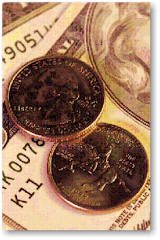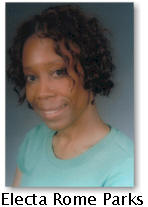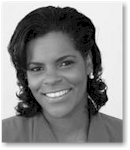[
 Handling Your Finances ’ Lessons from an
Author in Transition
Handling Your Finances ’ Lessons from an
Author in Transition
by Lynnette Khalfani
Lessons from an Up-And-Coming Talent
When Electa Rome Parks got downsized from her job as a technical writer on April 1st, some people might've thought it was an April Fools' Day hoax. After all, Parks was going into her 11th year with Bank of America, was well-liked by her boss, and had been an Assistant Vice President with the company.
’It came totally unexpectedly,’ Parks says, recalling a painful and uncertain chapter in her life. ’I went through the normal phases: depression, feeling sorry for myself, all of that.’
Little did Parks know, though, that her unforeseen downsizing in 2003 would actually serve as a catalyst for her biggest career blessing to date. As it turns out, getting the axe from Bank of America cut Parks off from corporate America, but it jumpstarted her literary career: Six months after receiving a pink slip, Parks went from part-time writer to full-time author, landed a high-profile literary agent, and got a six-figure book deal with a major publishing house.
 Her first two self-published books
were picked up New American Library, a division of Penguin. Now, Parks' debut
work of fiction, The Ties That Bind, will be re-released in October, and
its sequel, Loose Ends, will be re-released in November. Parks' third
book, tentatively titled Almost doesn't Count, is slated for publication
in August 2005. It's a whirlwind start for a breakthrough talent emerging as one
of the hottest up-and-coming writers in black fiction.
Her first two self-published books
were picked up New American Library, a division of Penguin. Now, Parks' debut
work of fiction, The Ties That Bind, will be re-released in October, and
its sequel, Loose Ends, will be re-released in November. Parks' third
book, tentatively titled Almost doesn't Count, is slated for publication
in August 2005. It's a whirlwind start for a breakthrough talent emerging as one
of the hottest up-and-coming writers in black fiction.
’I really can appreciate how far I've come in the past 2 ’ years,’ says Parks, who lives with her husband, Nelson, and their two children outside of Atlanta. ’I'm proud of myself.’
And by all accounts, she should be. But getting in a ’comfort zone’ has taken considerable doing. Indeed, Parks' writing career ’ even at this relatively early stage ’ is a case study for authors wanting to break out of their own comfort zones and deal with transitions of all types. For whether it's evolving from self-published status to being a mainstream author, or making the switch from a 9 to 5 job to navigating the challenges of being a full-time author, Electa Rome Parks has been there, and done that.
Lessons From the Print On Demand World
 The Ties That Bind
originally came out as a Print On Demand title in May 2001. In 2002, after some
buzz about the book began to spread, Parks re-packaged the book as a
self-published title. But her experiences with Print On Demand publishing
offered a number of lessons she believes aspiring authors would be wise to heed.
The Ties That Bind
originally came out as a Print On Demand title in May 2001. In 2002, after some
buzz about the book began to spread, Parks re-packaged the book as a
self-published title. But her experiences with Print On Demand publishing
offered a number of lessons she believes aspiring authors would be wise to heed.
Parks took the POD option for the same reason that many first-time writers do: it's dirt cheap ’ at least in the short run. For Parks, going the POD route initially cost her only $500 or so. In her mind, that was a small price to pay for becoming a published author ’ and not having to do any of the administrative work associated with it, like getting ISBNs, registering for copyrights and so forth.
Soon, though, Parks began to think her publishing deal with Xlibris, the POD company she used, wasn't such a great bargain after all. For starters, orders weren’t filled in a timely manner and her readers sometimes had to wait as long as three weeks to receive Park's book, she says. Then there was the financial burden of her trying to maintain adequate inventory.
’The sent me 1 or 2 so-called complimentary copies,’ of her book, but after that, she had to buy back copies of her book at a discount of nearly 50%. ’That was the catch,’ she says. ’By the time I would get the books and try to go into bookstores, (which require discounts of at least 40%), I was barely breaking even. So very quickly I realized that wasn't working for me.’
When she used a distributor, it was worse. She was basically giving the books away. The final straw came when Xlibris increased the price of her book to $19 from $16, citing rise in the cost of paper. ’I thought once the price was set, it was set in stone. I also knew that most trade paperbacks went for $13.95 to $14.95.’ So when the price of The Ties That Bind jumped to $19, not only did it cost her more money to buy back her books, but her customers were forced to pay up too ’ and most readers weren’t willing to shell out $19 for a relatively unknown author.
Lynn Romula, a sales representative for Xlibris confirmed Parks' account of the waiting time to receive books through Xlibris. ’Once an author places an order, that's when the printer starts printing the books. For soft cover books, it's 10 business days plus shipping time. For hard cover books, it's 15 business days plus shipping time,’ Romula said. Additionally, Parks Print-On-Demand version of The Ties That Bind currently retails at Xlibris for $20.99, while Loose Ends sells for $21.99, according to Romula.
Self-published authors hoping to earn a profit from their books (and most of us DO want to earn a living at this, right?) should first weigh three important questions when considering using Print On Demand services:Will my books be priced in line with other competing titles in the same category?
Pricing your book out of the market is a sure way to turn off potential buyers.Can I afford to buy back my books from the POD company ’ at the discount offered ’ and still make money if I then re-sell my books to bookstores?
Is the length of time that I, or my readers, have to wait to receive the books reasonable?
For example: Your POD book may retail for $22 and you, as the author, can buy copies from your POD manufacturer for $11, a 50% discount. But think realistically about how much of a price break you’ll have to give a retailer like Borders just to get your title in that store.
Remember: with the online dominance of Amazon.com, not to mention the nationwide reach of retailers like Barnes & Noble, many bibliophiles are used to getting books instantly ’ or often as soon as 24 hours over the Internet.
If the answer to any of the above questions is NO, chances are you will have a tough time making money via Print On Demand ’ and you'd likely be best-served by considering other options.
Today, Parks chalks up her time as a POD author as a learning experience. ’That's pretty much how it's been for me. It's either sink or swim. You learn what works and what doesn't. You scratch off things that aren’t working, and move on.’
The Pitfalls and the Promise of Self-Publishing
As a self-published author, Parks assembled a team ’ including a publicist, graphics designer and typesetter ’ to help ensure her success. She financed the books with credit cards, personal savings and even a loan from her husband's 401(k) plan.
’The dollars definitely added up,’ she reveals. She expected to spend about $10,000 self-publishing, but the tab ran more along the lines of $25,000, including advertising costs, printing books, travel, paying for editorial work, and other expenses. ’When I did my taxes, and went back and pulled the receipts it was amazing. I was like: Did I really spend that much?’
That's when she realized how passionate she was about her work ’ to have poured so much money into a single book with absolutely no guarantees.
Fortunately, a deal with New American Library was not far away.
But Parks is quick to caution authors that while the promise of a six-figure offer and an upfront advance can put you on cloud nine, the reality is that the timing, the scarcity, and the terms of such deals may quickly bring you back to earth.
For instance, Parks got her three-book deal in October 2003, but it took until March 2004, for the contracts to be officially notarized, signed and sent to all parties. Finally, by the end of May 2004, she received her advance. ’I'm thinking I'm going to get this big check. But it doesn't work like that,’ she says, explaining that her contract calls for roughly six payouts over two years. ’So since May of 2004, I've received two payouts. This has been quite an adjustment when you're used to getting paid on the 15th and 30th of every month.’
Writers can use a number of smart strategies to cope with infrequent pay schedules, and to manage their finances wisely until that ’big’ deal comes along. Try these tips:
ESTABLISH A CASH CUSHION. Newly minted professional writers ’ especially those leaving a job ’ would do well to have at least three months savings set aside. So if your regular bills are $3000 a month, a $9,000 savings cushion is in order. In an ideal world, try to establish a cash cushion before taking the plunge as a full-time author. This will tide you over later when money is tight.CREATE A REALISTIC BUDGET. Self-published authors who write for a living should create an initial budget outlining the expected expenses associated with publishing their own work ’ everything from printing bookmarks to mailing press kits. At the same time, be sure to work up a realistic personal budget for you/your family. Think about all the normal living expenses that must be handled (mortgage, transportation, food, etc.) in addition to the new expenses you will incur as a writer/author.
CONSIDER THE BEST SOURCES OF FUNDING. Depending on your situation, you may have some unique sources of funding you can tap to bankroll your efforts. Some options include: salary/wages; self-employment income; tips; second job; inheritance/gifts; borrowed money (from a bank or family); alimony; pension; social security; savings; investments; or selling goods you own (car, furniture, etc.). Now think about what's most practical, given your own circumstances.USE CREDIT WISELY. Parks, like many authors, used credit cards when she was starting out. For lots of writers, this is their only way to initially finance the production or marketing of their books. If you must use credit cards, seek out low interest rate deals or secure 0% balance transfer offers. don't go into debt, however, without a plan to pay it off quickly. The average U.S. household has $13,000 in credit card debt and pays an average interest rate of 15%. If necessary, switch credit cards to get a better rate, To find the best rates on credit cards, visit www.bankrate.com and www.cardweb.com.
Being A Mainstream Author
Parks cites her na’vet’ about finances as the biggest misconception she had about becoming an author with a mainstream publisher. ’When I would hear these so-called Cinderella type stories about someone getting a six-figure deal, I was thinking: ’They received high six figures, a big payout. They had it made, life was great and there were no worries.’ I thought they had the publishing house really behind them. But I'm coming to find that that's not the case.’
The reality, she says, is that ’You've pretty much got to continue to hustle just like when you were a self-published author.’
While she is grateful for her book deal, and enjoys a certain degree of newfound celebrity as a traditionally-published author, Parks believes there is still much work to be done to raise her profile.
’The biggest disappointment has been the fact that I'm not getting as much publicity as I'd like,’ says Parks. As an author under Penguin's umbrella, Parks is vying, to a certain extent, with other better-known writers on Penguin's roster, including Terry McMillan and Eric Jerome Dickey. And publishers generally put most of their marketing muscle (translate: dollars) behind A-list authors. So although Parks has an in-house publicist at NAL, she has, at times, hired her own publicist for additional promotion. Additionally, Parks advertises selectively, spending money on high-impact publications such as African American Books That Click (www.booksthatclick.com), which targets Black readers.
Parks says the distribution muscle of large publishers is their biggest strength. ’They’re able to get books places I wasn't able to get them,’ she acknowledges.
All in all, she notes that she has fewer hassles now than she had when using print on demand services or going it alone. ’Either I didn't have enough inventory when I was POD or when I was self-published I was still trying to get the right distributors.’
Perhaps that's why Parks says she doesn't miss any part of being self-published. ’I really don't want to do all those things' self-published authors must do. ’Being the bill collector, the promoter, the person who arranges book signings, etcetera ’ you have to wear too many hats. And then you lose your focus on writing.’
And what advice would Parks give aspiring authors about what they can expect monetarily? ’I would tell them that if they are passionate about the writing itself, it can work.’ But you have to be ’willing to give up some things to reach your goals.’
’If you think it's a get rich scheme, then that's totally wrong. It's an illusion. Yes, you hear stories about the really big deals. But people kind of tend to exaggerate to make themselves look better,’ she cautions. ’The ones who are getting lucrative deals, they’re really rare.’
Support From the Home Front
It also helps to have a supportive spouse, Parks adds, noting that her own husband doesn't miss an opportunity to pass out postcards and let people know about his wife's books.
Even after she lost her bank of America job, he encouraged her to continue with her writing ’ since that's what made her happiest professionally.
After her downsizing, as Parks was working on her third book, she told a friend that she couldn't continue to spend the money she’d been burning through as a self-published author. It was time, she thought, to get an agent. Just two weeks later she received an email from agent Marc Gerald of Los Bravos Management in Los Angeles. (Los Bravos is now part of The Agency Group in L.A.). Gerald loved Parks' work and immediately set about shopping her titles. Exactly 30 days later, Parks had a three-book deal. ’It all happened really quickly. At one point there were three (publishing) houses involved (in the bidding), including two that were very interested. In that sense, it was like a dream come true.’
Gerald, who with Earl Cox of Earl Cox & Associates, recently co-agented Essence bestseller Nikki Turner, says he knows a winner when he sees one. And Parks, he believes, has the makings to become a superstar writer.
’After reading her, I felt there was just such an honesty to her storytelling, and a realness to her voice that it was easy to see why people were lining up for her,’ says Gerald.
’The interesting thing has been to watch her craft develop so quickly,’ Gerald adds. ’As an agent, the one thing you realize is that so many of the self-published black women are so very committed to the craft of writing and are aggressive ’ in the right way ’ in their pursuit of success. Electa is the embodiment of that.’
Parks' next book, Almost doesn't Count, centers around a young lady to goes home to South Georgia for the summer to take care of her mother, who's had surgery. She and her mom have never gotten along. So their time together represents a summer of discovery, as well some dramatic revelations about issues that have haunted them for years. Of course, there's a romantic interest woven in the story as well. ’All my stories have spice ’ and drama!’ she says with a laugh.
And then, turning serious, Parks declares: ’If there was not even one penny coming in, I would still write. I've always loved doing this.’
Looking back, Parks now counts that pink slip she received from Bank of America as a blessing, not a cruel hoax. ’If I had not been downsized, I would've still been at the bank, and working on my books on the side,’ Parks notes. ’But I see now that things happen for a reason.’
’’’’’’’’’’’
 Lynnette Khalfani, The Money
Coach, writes about money-related topics for the AALBC.com. She is the author of
Zero Debt: The Ultimate Guide to Financial Freedom and Investing Success:
How to Conquer 30 Costly Mistakes & Multiply Your Wealth. Sign up for her
free newsletter at
www.themoneycoach.net.
Lynnette Khalfani, The Money
Coach, writes about money-related topics for the AALBC.com. She is the author of
Zero Debt: The Ultimate Guide to Financial Freedom and Investing Success:
How to Conquer 30 Costly Mistakes & Multiply Your Wealth. Sign up for her
free newsletter at
www.themoneycoach.net.